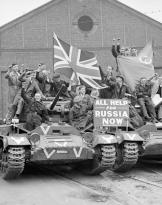Talking about the defense of Rome between the evening of 8 September 1943, a quarter of an hour after the announcement of the Italian armistice broadcast on the radio, and the afternoon of 10, when the local truce with the Germans came into force, means entering in a minefield.
Two generations of historians and a Special Commission of Inquiry, established in the 1944 and continued for 5 years, did not come to terms with it.
In this context, therefore, it is not the case to sever judgments, inevitably partial.
The task ofHistorical Office of the Navy, if anything, it may be to point out a decisive and absolutely ignored aspect in the current reconstructions of those events, carried out by the Navy.
Battleships or destroyers certainly did not fight against the German epanzergranadieren paratroopers in the hills or along the access roads to Rome.
It wasn't their job, of course.
But the invisible thread through the ether that kept the king and the minister and chief of staff of the Navy, Admiral Raffaele de Courten (photo) connected at all times (photo), was blue and was considered indispensable by all first moment of that tragedy.
The communications assured by the centers of the Marina di Santa Rosa and the Ministry on the Tiber were taken for granted by everyone.
The news received on the night between the 8 and the 9 September, of clashes and returns to the Germans, was understandable but no one ever doubted, not even for a moment, about the obedience and efficiency of the Navy.

It was a phenomenon all the more remarkable as, for example, the famous historian and journalist Giorgio Bocca wrote, in his "History of Partisan Italy", that not a single Army platoon went compactly in the bush, without ever being denied .
For the Navy this problem did not arise.
Under the direction of the Deputy Chief of Staff, Admiral Luigi Sansonetti, the General Staff, Supermarina, communications, services and ministry all continued to function regularly during that terrible night, as did the 9 and the 10.
They were formed by Italians like the others, so even among them, as would be seen later, harbored the passions and feelings of that unprecedented crisis that tormented everyone.
But the orders were to transmit, communicate, inform, report and act, and duty and obedience prevailed, as always, over everything.
On the afternoon of September 10 the Germans entered Rome, occupying the headquarters of the Supreme Command, the dicasteries and the Bank of Italy, but turned well away from the Marine Ministry, protected by 20 mm machine guns placed between Via Azuni and the shoulders of the bridges, as Aldo Fraccaroli, lieutenant of the commissariat recalled and testified with precise words, later, father of modern Italian naval historians.
Communications were ensured even then, using Navy field radios placed in the internal courtyard of the Palazzo. The king's order, by which Vittorio Emanuele III conferred full powers on Marshal Caviglia, passed from the hands of the lieutenant captain Marcantonio Bragadin, who gave precise testimony by affixing the regulatory protocol number and thus ensuring the transfer of powers.
At 17 and 17 on that same day Admiral de Courten announced that he was taking over the direction of Navy operations and practically the State from Brindisi.
The "blue thread" had never broken.
On September 14, an Anglo-American mission went to Brindisi. There were those who proposed that the Italian executive be dissolved tout-court and entrust the country, the work, the fate and the savings of its citizens to the allied military government "AMGOT"; he found the king, the guard assured by the students of Corso Vedette, who arrived with Columbo and Vespucci (photo below), and the Marina RT center in regular radiotelegraphic connection with all the towns that resisted the Germans: from Corsica to Elba up to Kefalonia and Lero.
The Navy, as always, was in the lead without asking, boasting, or demanding anything.
He did his duty, as in the past, now and always.













